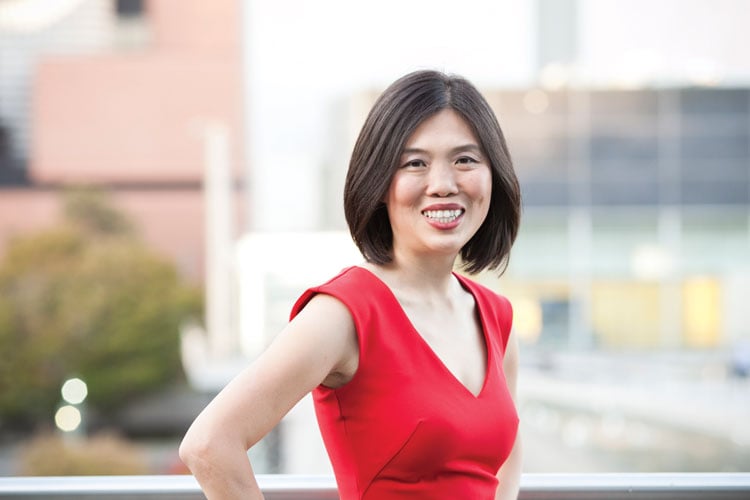Lawyers on balancing motherhood or choosing a child-free life

Photo of Jeena Cho courtesy of the JC Law Group
Motherhood is more demanding than ever. Parents spend more time and money on child care. They feel more pressure to breastfeed, to do enriching activities with their children, and to provide close supervision. And women underestimate the costs of motherhood. This was the recent finding reported in a New York Times article, “The Costs of Motherhood Are Rising, and Catching Women Off Guard.”
Whether and when to have a child is a complex issue for which there is not much guidance. I recall a mentor suggesting that having a child in my 20s would be career suicide, and I should put off having children as long as possible. I learned the hard way that the biological clock doesn’t wait for your career—that waiting could mean missing the opportunity to have your own biological child.
Female lawyers struggle and come up with various solutions for balancing motherhood with their careers. Some also make the very deliberate decision to be child-free. And it certainly affects one’s sense of well-being—no matter what one chooses.
CHOOSING CHILDREN
Chelsie Lamie, a personal injury lawyer in Safety Harbor, Florida, had a greater vision when she started her own law practice. “I created a baby-friendly law firm. I instituted a paid family leave policy—six weeks paid at 100 percent—and encouraged my employees to bring their babies to work. We eventually opened a day care in the office,” she says.
She is very clear about her priorities. “I always put my kids and family vacations on my calendar first, then trials,” Lamie says. She is able to do this as a plaintiffs lawyer because she has more control over the trial calendar than if she was on the defense side. She also intentionally keeps her caseload at about 100 cases so that she doesn’t feel overwhelmed.
Kelly Erb is a tax attorney in Paoli, Pennsylvania. She practices with her husband, also a lawyer. She has three children and says she thinks about how her decisions will impact them all the time.
“A significant portion of my brain is devoted to my children. We’re also of a generation where we’re also responsible for taking care of our parents. So now we have to figure out how to take care of not only our children but also our parents,” Erb says.
Erb and her husband decided not to send their kids to day care until the children were old enough to speak, so they brought the kids to the office. “Anybody that interviewed for a position at our firm, I made it very clear that my children were going to be at the office. Having staff that was aware of what my priorities were was very helpful,” she says. She also set expectations early with her clients and her staff. “I try to be a parent first, then a lawyer second,” Erb says.
She finds it empowering that she can balance motherhood with lawyering. “I look back and see that I’ve been responsible for these kids, and they are thriving. And [I can] still be successful at work,” she says.
Merle Kahn is of counsel at the Law Offices of Daniel Shanfield in San Jose, California. She had children later in life. She decided to work part time because “both my teenagers developed health issues necessitating that one of us be able to be home with them at all times,” she says.
She always assumed that once her youngest was in high school, she would be working full time, but that never happened. “Very fortunately for me, I found a position as of counsel at a local immigration firm. I set my own hours and work on the cases that need time, patience and expertise. I don’t get paid as much as I would like, but I have the flexibility that I need,” she says.
She readily admits that the choices she has made were right for her and her family, but still she wonders on occasion where she would be if she had not made those choices. “Would I be at the ACLU running their immigration department? But [this choice] was worth it for me,” Kahn says.
Danielle Pener, principal attorney at Alta Employment Law in San Francisco, has a 2-year-old child. She has refined her employment law practice to limit litigation so that she can have time for her son and meet the needs of her clients.
She was almost 41 when she had her son. She stresses the importance of normalizing being a parent and a working lawyer. All three of the other lawyers at her firm also have children. “They’re all very good lawyers and also are the primary parent, like I am,” Pener says.
It’s important for Pener to be transparent with her clients about her boundaries. She isn’t shy about telling her clients: “I’m sorry, but I don’t have child care. I can take the call now, but there will be background noise from my toddler. Or we can speak later this evening.”
Like many lawyer moms I spoke to, Pener struggles with feeling overscheduled. She tries to reduce the overwhelm by practicing being present with her son, even if it’s just one to two hours before bedtime.
Each day is a new learning opportunity. There are many days where she feels like she is a bad lawyer and a bad mom. But the next day, she feels like she’s a great lawyer and a great mom. The next, great lawyer, bad mom. Every day is different, and when something gets out of balance, she just tries to right the ship before it gets too far off course.
Jeena Cho consults with Am Law 200 firms, focusing on actionable strategies for stress management, resiliency training, mindfulness and meditation. She is the co-author of The Anxious Lawyer and practices bankruptcy law with her husband at the JC Law Group in San Francisco. This article was published in the November 2018 ABA Journal magazine with the title “Family Way.”



